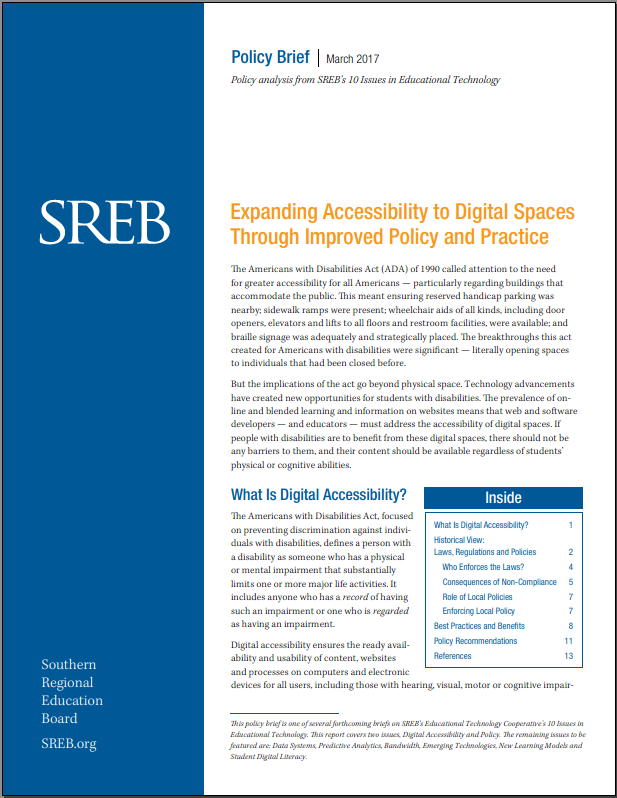Policy
Policy
Maintain regular state-level review of technology-related legislation and policies on education standards, access and infrastructure to ensure that these policies are adequate, necessary, aligned and integrated.
Maintaining a sound policy framework for education technology means ensuring that it supports relevant standards, strong accountability systems, equitable access to education, and practices that allow students to make continuous educational progress. It is also critical to align these policies with state and federal laws and regulations, and with system-wide or district-wide policies.
What if SREB states do not make adequate progress?
When local or state policies are not aligned with federal guidelines, schools and districts inevitably become confused, make mistakes, and repeat work unnecessarily — or leave work undone. These errors exacerbate the strain on schools and agencies that are already understaffed and underfunded.
Educational technologies change quickly, and policies on technology infrastructure and data systems must be flexible enough to incorporate new tools and practices — yet secure enough to ensure the privacy of the data they contain. Well-meaning but unnecessary policies can, and often do, present barriers to innovative learning models and emerging technology tools.
For example, competency-based education, and personalized, adaptive and self-paced learning models in general, are often inhibited by policies that award credit based on time spent in a course (referred to as seat-time) rather than mastery of course content. They are also thwarted by financial aid models that count the number of academic terms by the calendar (and pay accordingly) rather than by the completion of modules. As technology systems and various digital tools provide other ways to account for academic progress, the related policies need to be flexible enough to support these innovations. Education reform and policy change must go hand in hand.
Schools and colleges generate more data than they can readily use, and they need policies that protect students’ security and privacy. However, restrictive policies about what information to collect, how to collect and use and transmit it, and how long to keep it can inhibit policy analysis.
Researchers need access to rich data sets to conduct longitudinal studies of success and of equitable access. These data need to be linked from K-12 to higher education so that researchers can study the long-term effectiveness of technology innovations and of new digital learning models in promoting deeper learning.
Well-meaning but unnecessary policies can, and often do, present barriers to innovative learning models and emerging technology tools.
Policies are only as good as their implementation. Both the University of California System and the University of California at Berkeley had strong policies on how faculty and staff were to implement their online courses so that these courses would be fully accessible for students with disabilities. But having adequate, aligned policies on digital accessibility was not enough. The university did not have an enforcement mechanism, and few faculty followed the policy. Potential students who could not access the university’s online courses filed lawsuits and engaged the university in drawn-out negotiations.
State and local agencies need policies that are more than suggestions. They need to enforce them if they expect them to be effective.
Education reform and policy change must go hand in hand.
Higher education institutions in SREB states that are engaged in distance learning have an opportunity to align themselves with a strong new regional and nationwide policy on distance education. A section of the 2010 revision to the Higher Education Opportunity Act focuses on the quality and integrity of distance learning programs. Several organizations, including SREB, worked toward informed, collaborative policies that would align with the Act.
Currently, the four regional compacts — Southern Regional Education Board, New England Board of Higher Education, Midwestern Higher Education Commission, and Western Interstate Cooperative for Higher Education — work with a national council to oversee distance education authorization and nationwide quality standards. This collaboration provides strong policy to promote quality, reciprocity and alignment — with accountability to both students and institutions.




